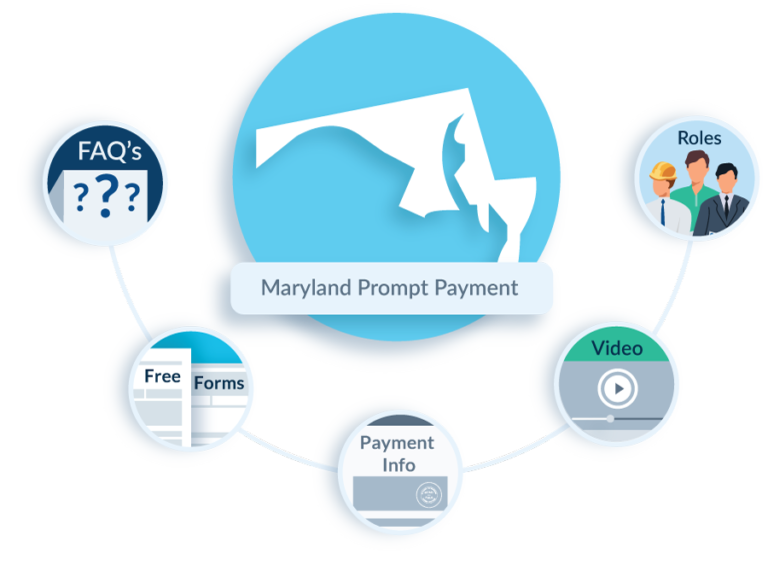Maryland Prompt Payment Requirements
- Private Jobs
- Public Jobs
- Top Links
Prime Contractors
For Prime Contractors, progress payment must be made within 7 days of dates for payment specified in contract for undisputed amounts. Final payment due within 30 days from occupancy permit or 30 days from when owner takes possession.
Subcontractors
For Subcontractors, payment due within 7 days of payment being received from above.
Suppliers
For Suppliers, payment due within 7 days of payment being received from above.
Interest & Fees
Interest not set, presumably the judgment rate. Interest accrues from date court determines amounts were due. Attorneys' fees only available when the nonpaying party acted in bad faith by not paying undisputed amounts.
Prime Contractors
For Prime (General) Contractors, payment is due within 30 days from date payment due under the contract or 30 days from receipt of invoice.
Subcontractors
For Subcontractors, payment due within 10 days after payment received from above.
Suppliers
For Suppliers, payment due within 10 days after payment received from above.
Interest & Fees
Interest at 9% year accruing from the 31st day after payment due.
Prompt payment laws are a set of rules that regulate the acceptable amount of time in which payments must be made to contractors and subs. This is to ensure that everyone on a construction project is paid in a timely fashion. These statutes provide a framework for the timing of payments to ensure cash flow and working capital.
Projects Covered by Prompt Payment in Maryland
The state of Maryland regulates prompt payment on both private and public construction projects.
Private Projects
All private construction projects within the state of Maryland are governed by Md. Code. Real. Prop. §§9-301 et seq. The only exception to these rules are contracts for the construction and sale of single-family, residential dwellings.
Payment Deadlines for Private Projects
For payments from the property owner to the prime contractor, if the contract sets out specific times or dates for payment, progress payments must be made within 7 days after the payment date provided in the contract. As for final payments from the owner to the prime, the owner is required to release final payment within 30 days of either, the day the occupancy permit was granted, or the day the owner takes possession of the property; whichever is earlier. Once the prime contractor receives payment from the owner, they must pay their subcontractors and suppliers within 7 days of receipt. The same timeframe applies to payments from subs to their sub-subs and suppliers.
Penalties for Late Payment on Private Projects
The prompt pay statutes do provide a list of reasons when payment can be withheld. However, if payment is late, or unjustified, then interest penalties will be imposed. The rate is not specified in the prompt pay statutes, but it is presumably the judgment interest rate which is 10% per year (0.833%/month). The interest will begin accruing on the date the court determines that the amount was due. In addition, if the court determines the non-paying party acted in bad faith, the prevailing party may be awarded attorney fees.
Public Projects
Payment on all Maryland public works projects are governed by Md. State Fin. & Proc. §§15-101 et seq., and §15-226.
Payment Deadlines for Public Projects
The government entity that contracted the work must pay their prime contractors within 30 days of either the day the payment becomes due under the contract terms, or after receipt of a proper invoice; whichever is later. Once a prime contractor has received any type of payment from the public entity, they must pay their subcontractors and suppliers within 10 days. This 10-day turnaround applies to subcontractor payments to other lower-tiered sub-subs or suppliers.
Penalties for Late Payment on Public Projects
If any payments to the prime contractor are late, or otherwise wrongfully withheld, interest penalties will be imposed on the unpaid balance. If payment is more than 45 days later after the public entity received the invoice, interest will begin accruing at a rate of 9% per year, starting on the 31st day (i.e. the first day payment was late). This essentially offers a 14 day grace period to make payments without interest penalties accruing. There are no interest provisions for any other payments. Nor are there any provisions regarding attorney fees.

